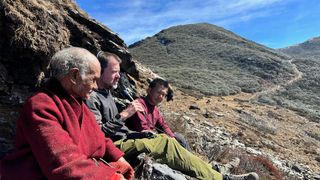A search for the Yeti ended remaining month with a single strand of horse hair, a BBC Radio 4 program overlaying the Himalayan hunt has revealed.
Andrew Benfield, a creator and meditation teacher, has spent years looking out for the Yeti collectively along with his skeptical buddy and political analyst Richard Horsey. The pair traveled by India, Myanmar, Nepal and Bhutan, listening to tales regarding the legendary creature and at last making “Yeti,” a BBC Radio 4 sequence about their search.
The sequence accomplished on a cliffhanger in June — a mysterious hair geared up by an unnamed provide awaiting DNA analysis. A bonus episode revealed Oct. 20 has now revealed the hair obtained right here from a horse.
Benfield knowledgeable Reside Science the result “didn’t actually really feel good” after three years of trying. “A horse was about as boring as we’d get,” Benfield said. Nevertheless the DNA analysis wouldn’t invalidate the sequence or the tales of the people they spoke to, in response to the pair.
Related: Primarily probably the most well-known Bigfoot sightings

Tales of an ape-like creature roaming the Himalayas date once more centuries. Western curiosity inside the Yeti, or Abominable Snowmantook off inside the early Fifties after British mountaineer Eric Shipton returned from Everest with pictures of enormous footprints. Subsequent investigations led by westerners failed to hunt out any scientific proof of the creature’s existence.
Having labored in worldwide enchancment, Benfield didn’t like that native accounts of the Yeti had been dismissed just because white explorers hadn’t found one. He was moreover reassured by a Sir David Attenborough interview filmed in 2013, whereby Attenborough said he thinks “there’s maybe one factor inside the Abominable Snowman thriller.” Attenborough wouldn’t take part inside the new radio sequence.
Benfield set out in 2019 to take heed to first-hand tales of the Yeti and invited Horsey, who has a PhD in cognitive psychology, to affix him. “If I would persuade him, I knew I was on to 1 factor,” Benfield said.
The BBC turned involved in 2022, merely sooner than the duo headed to Bhutan and the Sakteng Wildlife Sanctuary, a 286-square-mile (740 square-kilometer) nationwide park established, partially, to protect the “Migoi,” or Yeti, in response to the Day-to-day Bhutan. Proper right here, Horsey lastly will get a story that shakes his skepticism, and Benfield acquires the purported Yeti hair.
The hair was about 6 inches (15 centimeters) prolonged. Benfield reduce it in half and despatched piece to Charlotte Lindqvistan evolutionary biologist on the School at Buffalo in New York. Lindqvist and her crew found the DNA matched Altai horses, a mountain breed from Asia.
Lindqvist was moreover part of a 2017 look at revealed inside the Proceedings of the Royal Society B that analyzed 9 purported Yeti samples and positioned eight obtained right here from bears and one obtained right here from a canine. She has beforehand said that she has little query the creature is a fable.
Benfield accepts the DNA outcomes nonetheless nonetheless hasn’t parted with the alternative half of the hair, which he knowledgeable Reside Science is for the time being in his cupboard. He moreover spoke of the large, untouched, unexplored nature of the Himalayas and said Yeti tales come from people who know the world.
“You positively respect native people’s knowledge when you’re up there on account of they’re sustaining you alive,” Benfield said. “Who am I to question these people? They’re available on the market on each day foundation.”
Horsey didn’t assume they’d come once more with DNA proof, nonetheless knowledgeable Reside Science the Yeti is further essential to native people than he’d ever imagined. “We realized it could not really matter to most of these people whether or not or not it bodily exists,” Horsey said. “It’s the operate that it performs of their world.”

Creator Tshering Tashi detailed Bhutanese notion inside the Yeti in a 2020 article for Kuensel On-linethe net model of Bhutan’s nationwide newspaper. In it, he said that folk in Bhutan are glad that the Yeti exists nonetheless are in “no hurry” to offer proof.
“Whereas there’s positively a natural being behind the mythology, we think about that it will not be inside the type and type that Westerners have romanticised it to be,” Tashi wrote.
